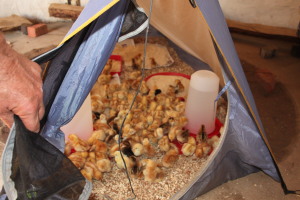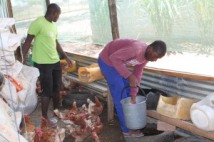Post Title: 017_Chicks Arrived!
Written Date: 20 Feb 2016
Posted Date: 21 Feb 2016
Day-old chicks were finally delivered, today! (Actually 2 days old. They doubled their age while in shipping.)
In early December, the restart of the poultry program was funded with a total of US $ 488.89. The Penduka managers extend their thanks to everyone. Four of the contributors were my friends and family, but there was a fifth person I do not know that found the project and contributed a substantial amount of the total needed. Here are the highlights of the long-awaited delivery of chicks to replenish the poultry farm at Penduka.
After the project was funded, we ordered 150 day old layer chicks. There are three basic types of chickens, with many breeds. “Layers” are hens that are used only to lay eggs. Modern improvements in layers result in a planning number of 4 eggs/layer/week, and we were getting about 4.7 in November of last year. It is lower, now. “Broilers” are hens raised for meat. That’s the kind you buy in grocery stores in the chic ken section. “Roosters” are males, and can be used for meat also.
The specific breed that we ordered are “Lohman Red”, the breed we already have. When our poultry operation is operating on a rotating stock “sustainable” basis, we may start working with other breeds to see what works best here at Penduka. Our primary goal is to sell eggs. The meat is only the sensible economic and nutritional use of old layers in our business model.
The beginning of February we were notified that the chicks would be picked up by the distributor on Feb 19. This morning (Sat, Feb 20) the chicks and equipment were delivered! Some photos:

Below, click on the image to see the caption. Right click and display to see a zoomed image.
Now we take care of them for 20 weeks until they start laying eggs, then we replace the existing layers: 132 remain as of today, out of the original amount of 150 chicks in October 2014. They are beginning to show age and production of eggs is dropping. The existing layers will be used by our restaurant, and sold for meat to the community.
This was my first relatively significant (VERY small compared to things going on now!) project with Penduka, and it served as a valuable experience learning the business culture and how to get things done in Namibia. Here are some of the lessons I learned, mistakes I made, and good things that happened.
Disclaimer: OF COURSE all of what I say below does not apply to every individual. But these are widely recognized tendencies throughout Namibia, to both expats and Namibians, that are very recognizable to anyone working here.
Working with the people here:
The people are very anxious to learn and grow, and succeed. They are very smart in what they know and what they are used to. They are a very good example of the difference between Education and Intelligence, and the role of personal drive and ambition as in any people, anywhere.
The lessons of culture started to become real to me with the Poultry Restart Program in ways that were meaningful, not just out of a book. I’m still (February 2016) learning about this every day. There is no better way to describe it that I can think of other than to say they just think differently, at a fundamental level, than people do in the cultures in the USA or the major economic countries in the European Union. The trick is to be open to that, and to understand what is going on. What seems like an arbitrary or thoughtless decision on their part, or something that flies in the face of logic, makes perfect sense (usually) when you understand what is going on in their mind. In all honesty, this is no different than working with different people within the United States, or in any culture.
In a training the other day, I hit on an example that made this clear to them in a way that really hit home – for them! I told them when I got here I had no idea how to make Marula oil. (The Marula tree nut is widely used for the oil, which is a nutrition filled fluid used often in cooking, and is also a cosmetic aid.) They had a really hard time believing this. It is so ingrained in their culture that the idea of someone NOT knowing how to do it simply wasn’t part of their reality. Then I asked them the average price of an apple if you had 2 apples that cost a total of $10. The concept of an “average” was beyond them, and they were VERY confused when we discussed one apple costing $4.00 and one costing $6.00, but the average was the same. These folks are very immediate and see a specific thing that is in front of them. “Abstract” reasoning is a very difficult thing for them. When we talked it over in training they still didn’t get the idea of Averages, but they are least understood that to me, their lack of understanding averages was as weird as my not knowing how to make Marula Oil was to them!
By the way, they taught me how to make Marula oil since then. If you find yourself running short of Marula oil in the kitchen or vanity, let me know and I’ll tell you how to fix some up from the nuts on your back yard Marula tree. Just be prepared to do a LOT of pounding a heavy stick.
Doing business here:
It has become a “given”, at least to me and everyone I know of that lives or works here, that phone calls or emails won’t be returned on time, or at all. There are very happy exceptions, but they are by far the exception.
Appointments for a specific time are virtually meaningless unless the people involved are younger and work in an urban setting and even then arriving on time doesn’t happen often. Time simply doesn’t have the same meaning here, and I still don’t quite understand why but we have some theories. Maybe more on that in a future blog. I’m happy to say it doesn’t drive me crazy any more – it’s just “that way”. It is frustrating at times, but what is interesting is that it is ALSO frustrating to the people here! They are just used to it.
Personal Responsibility:
The idea of being personally responsible for what you agree to do is also not a commonly accepted thing. “Accountability” as a concept is equally strange and new. To the managers and staff here, they don’t resist it, but they just don’t get it!
The beginning of February we started a training program for the four senior managers and this topic is one of the first we are taking on both explicitly and implicitly in the training programs and the way the company is being structured. Wish us luck!
So – I have to stop here. By tomorrow I have to have (1) A proposal for well over NAD $100,000 to build a greenhouse for a new Aquaponics installation (more on that later, also), (2) A financial summary for 2015 including 2016 budgets so the Board of Trustees can hopefully approve a very modest salary increase for some of the staff, and the need to hire some new people, (3) A different proposal document with executive summary of Penduka for another project we are seeking to fund through a Namibian organization, here, (4) several smaller projects that must be completed by tomorrow to even be useful.
This is a VERY busy job, but it is part of today’s Africa. I love my job, but it is sometimes exhausting.
As always, please “FOLLOW” this blog. Button is on the lower right corner. It helps me know who is reading, and it is an encouragement for me to post a new blog.
Andy




I’m surprised hens are considered “old” at 2 years. Are the fed the same as here? Sounds like the same breed my grandparents raised, and I’m sure the hens were producing longer than 2 years.
Good luck on the proposals! I’m glad you’re enjoying yourself. Take time to rest and relax.